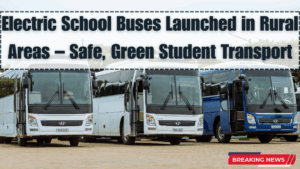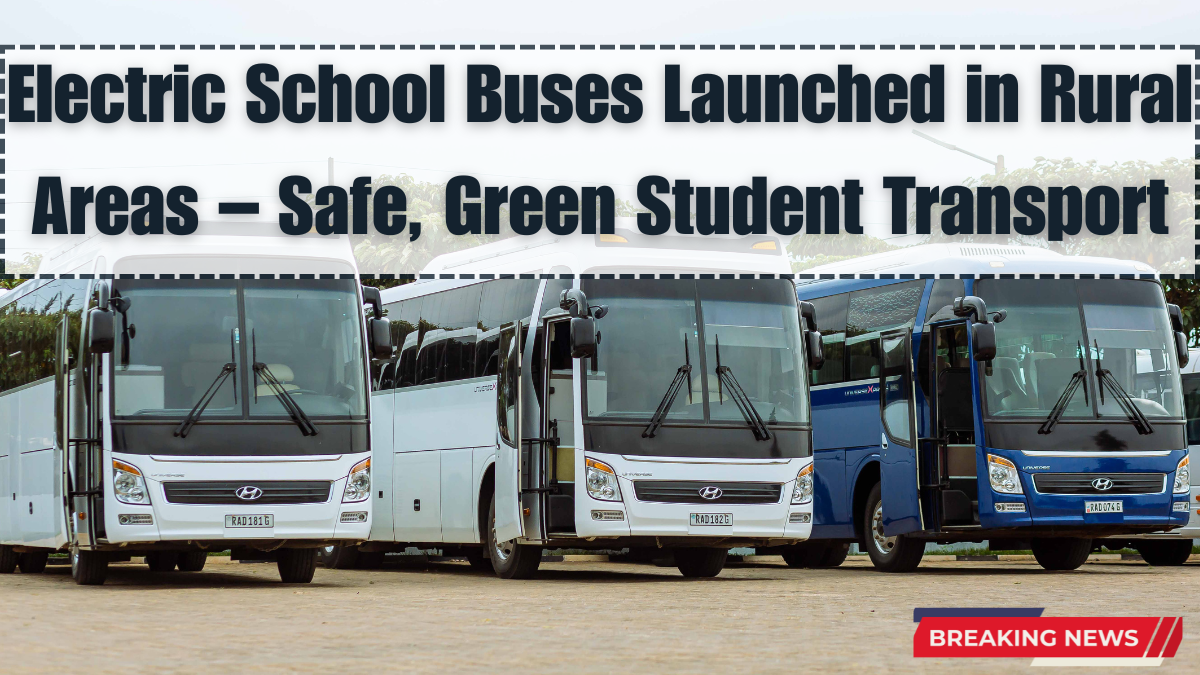In a major boost to rural education and sustainable transport, the government has launched a pilot program introducing School EV Buses in several districts across Maharashtra. These electric buses are now actively transporting students to and from schools in villages and small towns, offering a cleaner, safer, and more reliable option for daily Student mobility.
With this initiative, EV Bus technology has officially made its way into India’s rural education ecosystem. The aim is not only to ensure punctual school attendance but also to reduce vehicle emissions and introduce students to clean technology at an early age.

How the EV Bus Initiative Works
The program currently includes multiple electric buses operating on fixed school routes in districts like Ahmednagar, Wardha, Nanded, and Satara. Each School EV Bus is equipped with safety features and powered entirely by battery technology, emitting zero pollution during operation.
Key features of the EV Bus fleet include:
-
GPS tracking and real-time monitoring
-
Speed governors for safe village travel
-
Child-safe seating and emergency exit features
-
Operated by trained drivers and safety staff
-
Quiet, smooth ride to improve student experience
These buses are making a visible difference in Rural Education by ensuring safer, on-time school commutes, even in regions that lacked structured student transport.
District-Wise EV School Bus Operations
The project is a collaboration between the state education department and local panchayats, with buses supplied by certified electric vehicle manufacturers. The pilot phase has received strong local support and is expected to expand in coming months.
| District | No. of School EV Buses | Coverage Area |
|---|---|---|
| Ahmednagar | 10 | 25+ schools in 4 blocks |
| Wardha | 7 | Tribal belt and hilly zones |
| Nanded | 8 | Border villages and towns |
| Satara | 5 | Agricultural zone schools |
These operational routes were selected based on distance, terrain, and the availability of conventional school transport.
Student Mobility Reimagined for Rural Schools
This rollout of School EV Buses is changing how rural students perceive transportation. Instead of walking long distances or relying on unsafe alternatives like shared bikes or tractors, students now have access to well-equipped EV Bus transport that’s both safe and timely.
Benefits for students and their families:
-
Reduces absenteeism due to long travel times
-
Lowers family dependency on private transport
-
Introduces environmental values at a young age
-
Enhances access to schools in difficult-to-reach areas
-
Reduces carbon footprint in school zones
The project is also raising awareness about electric vehicles and their potential to transform Rural Education infrastructure.
A Big Step Toward Sustainable Rural Education
The launch of School EV Buses marks a turning point in combining education with environmental consciousness. These buses are doing more than just moving students—they’re moving mindsets toward clean transport and smart planning.
With active routes already running and positive feedback from parents, teachers, and local authorities, this Student mobility initiative is expected to scale quickly. It’s an investment in both academic futures and a greener India.
FAQs
What are School EV Buses?
School EV Buses are electric-powered vehicles used to transport students in rural areas. They are equipped with modern safety and comfort features and emit zero pollution.
Where are these EV Buses currently operating?
The buses are already running in districts like Ahmednagar, Wardha, Nanded, and Satara as part of a rural EV Bus pilot project.
How do these buses benefit Student mobility?
They reduce travel stress, improve safety, and help students reach schools on time—especially in remote or hilly zones.
Are the buses safe for children?
Yes, all School EV Buses include seat belts, speed governors, GPS tracking, and trained staff to ensure a safe commute.
How does this support Rural Education?
By offering free, clean, and reliable school transport, the program supports increased school attendance and builds better access to quality Rural Education.
Click here to know more.
